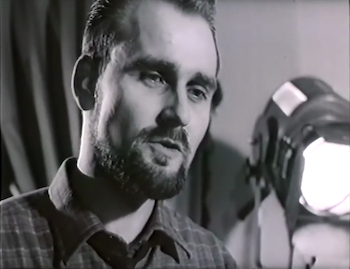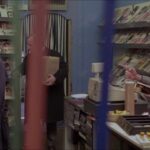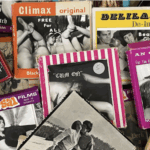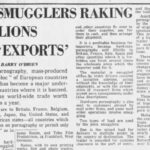On good authority, I have been told that Rodox Trading/The Color Climax Corporation co-founder Peter Theander passed away last week. Arguably the first large scale transnational producers of pornography, Peter and his brother Jens were major players in the development of the Danish porn market and the international pornography business. The Theander’s first sold British pornography in their Copenhagen antique bookshop before moving on to produce their own magazines and films. A long out of print book edited by Gordon Schindler titled A Report on Denmark’s Legalized Pornography includes a rare interview with Peter Theander. Published by the Californian house Banner Books in 1969 – the year when Denmark legalised all pornography – the book is a fascinating time capsule, containing interviews with those involved in the trade and a range of illustrations, including bookshops and adverts.
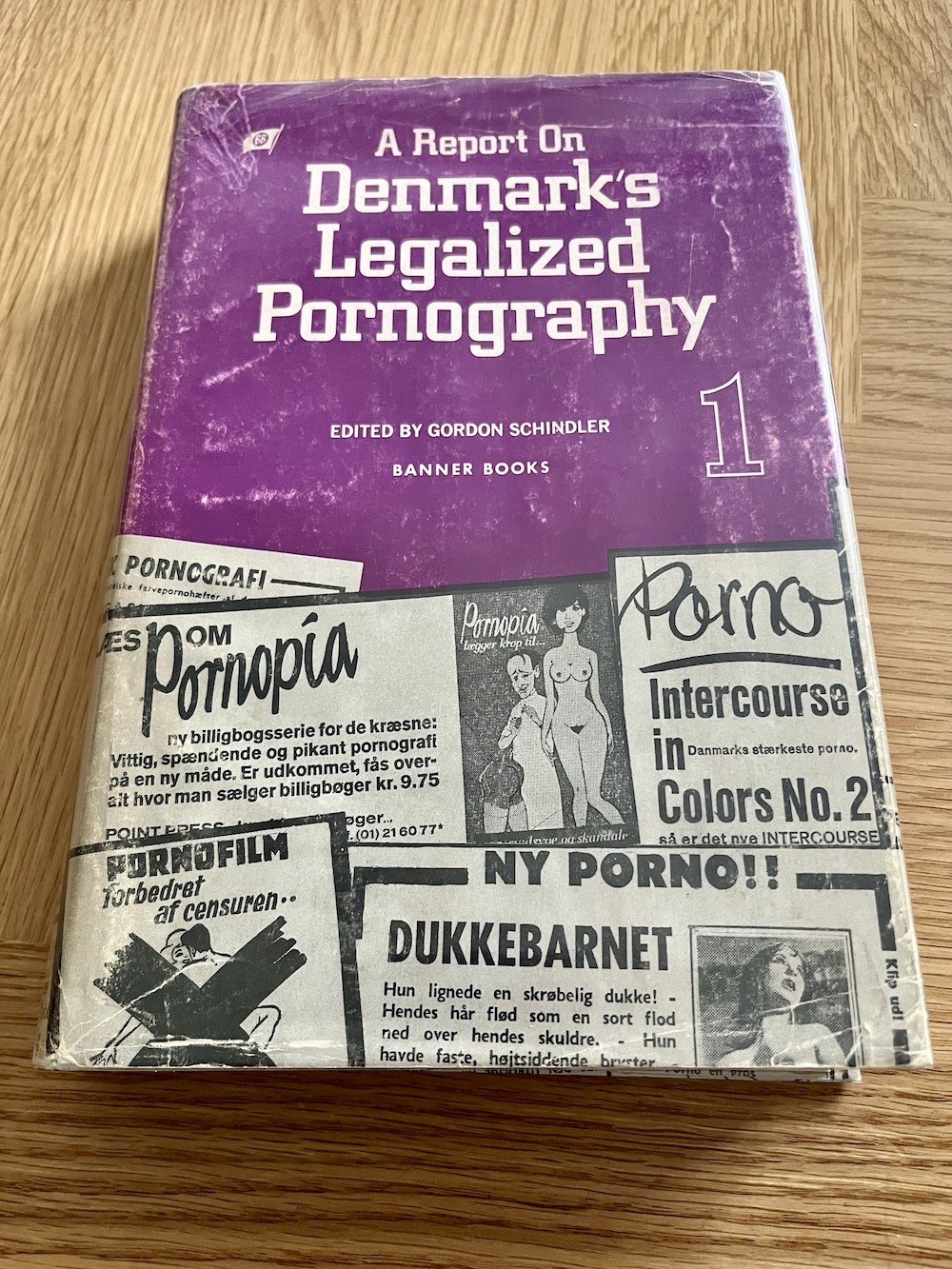
While writing Under the Counter, I did write a letter to Peter Theander, asking if he’d speak about his working with British pornographers. Unsurprisingly, I did not receive a response; Theander rarely gave interviews. Therefore, I reproduce an interview with Theander from A Report on Denmark’s Legalized Pornography. Conducted by an unnamed reporter in 1969, Theander talks about legalisation, the policing of pornography in Denmark and the fast-evolving Danish pornography market. Here’s the first part of the interview, the second will feature in a later post.
Reporter: Will you introduce yourself please?
Peter Theander: My name is Peter Theander, Copenhagen. We operate as Rodox Trading.
Reporter: Is there anything you would like to say about your business before I start asking you questions? Some general statement you might like to make? You were just mentioning something about the post office that seems to have been interesting and you also made reference to the Police Department. What particular problems have you had with the Police Department in the past?
PT: For years the police came here every week and took our magazines. It was not easy for us at that time.
Reporter: Exactly what laws were there then? Say about four years ago.
PT: Oh, four years ago? That was too early; We weren’t started at that time I think we started three years ago comment my brother and I.
Reporter: And even then the laws were such that the police could give you trouble for what you were publishing?
PT: Yes.
Reporter: Do you have anything that you published at that time that I might take with me?
PT: Yes, I will try to find something. It was around this time that we made photos with more action. Then the police tried to find out how much we could show.
Reporter: How far could you go?
PT: Yes. It was not easy, because the law was so vague.
Reporter: How did that material compare three years ago with what you’re publishing now?
PT: Three years ago, it was girls alone, sitting and standing in various poses.
Reporter: Rather innocent though, really?
PT: No, it was not innocent it was just like the things you see in the US today.
Reporter: That’s what I was going to say. It would be what they consider in America “spread shots” in – girls with their legs apart. And still, that was the kind of thing they thought was beyond the Danish law, even then?
PT: Yes, that’s right.
Reporter: Exactly what part of the business are you in?
PT: we are publishers of magazines.
Reporter: Then you wholesale to the various stores around town?
PT: Yes. We have a store, too.
Reporter: What was the general business atmosphere at that time?
PT: Well, business was the same, I guess. As a company we were very small at this time. We had just started and there were three or four big companies. Then all the trouble with the police started then they nearly closed the other companies. But we were so small here that they didn’t see us.
Reporter: What was the cause of the trouble? What were they after?
PT: They were after the magazines because they thought they were two strong.
Reporter: Did somebody make complaint?
PT: Yes, they wouldn’t allow the girls spread shots.
Reporter: Who started the trouble?
PT: The chief of police.
Reporter: He decided that you went too far?
PT: Yes, and at the same time we started here with a type of magazine called Petting with one couple. Not real intercourse, but one man and one girl in different poses.
Reporter: It was like what we in the U.S. would call simulated. It looked like they were doing something, but they weren’t.
PT: Yes, they looked like they were, but you didn’t see anything. I saw a magazine from the US with one couple just in the same way.
Reporter: Yes, they’re beginning to approach that stage now. How did these problems with the police resolve themselves? Were the publishers taken to court and convicted or were they freed of the charges?
PT: The police just made some raids. They were interested in the magazines. They took all the magazines with them and then the companies had nothing to sell.
Reporter: Well, you could print more, couldn’t you?
PT: Yes, but the next week the police would come back.
Reporter: Then it was a harassment movement more than anything else, to put you out of business. That’s what we call harassing tactics. They bother you and try to put you out of business – causing you to run out of money, for instance.
PT: Yes. It cost too much money.
Reporter: What was done by these companies about this? How did they defend themselves against the police?
PT: Some other companies stopped publishing magazines.
Reporter: Went out of business?
PT: Yes. They were afraid. They had too much to risk. They had made a lot of money years before and didn’t want to risk it.
Reporter: Is Delhi Forlag still publishing magazines? [N.B. Based in Lyngby, Denmark, Delhi Forlag was an early publisher of Danish pornography ran by Sven Nielsen from the late 50s/early 60s onwards. Porn Gold states that Nielsen maintained links with Soho pornographers, and was involved in processing rollers for certain British producers].
PT: Mr Nielsen doesn’t publish anything today, except Vue.
Reporter: You mean actually he actually suspended all these publications because of these troubles?
PT: Yes. Today it’s only real hard pornography which will sell here in Denmark.
Reporter: Why doesn’t he go back to publishing pornographic magazines, if it’s legal to do so?
PT: It’s not easy now. There are so many new publishers that it’s not easy to make money now. The prices are very low.
Reporter: One of the things I heard before I came over here was that business had dropped off considerably.
PT: Business is not falling off. Business is the same but there are many more publishers. It is prices that have dropped more than the business.
Reporter: You mean you’re selling as many magazines as before, but for less money?
PT: That’s right
Reporter: But you still make a good profit.
PT: Well, we publish more titles, so it works out. So many people tried to start now because they think it is a very good business. However, it’s just a normal business today it’s the same as making a living in any other endeavour.
Reporter: Do you think in the next year or two the number of publishers will diminish?
PT: Yes. Many of the small publishers will stop, of course. Each month it takes more money and better quality to stay in business.
Reporter: Do you sell most of yours to tourists coming into Denmark?
PT: Yes. To tourists and people from other countries who will take the chance to import them. Naturally it is not legal but this is not my business. I only sell magazines.
Reporter: What percentage of your business would you say is local and what percentage is sold to tourists?
PT: I do not know how much we sell tourists, but I guess 25% is sold in Sweden and 50% is sold in other countries all over the world and 25% is sold here in Denmark.
Reporter: By mail order?
PT: Some by mail order, mostly wholesale and export, though.
Reporter: Where is your biggest export market?
PT: Germany.
Reporter: They have the same problems there, don’t they? Don’t the police confiscate these magazines when they’re going to Germany?
PT: Yes. They put one man in jail for importing them.
Reporter: Is there any country in the world where you are able to ship your merchandise, where it is accepted on a legal basis as it is in Denmark?
PT: Yes, Sweden.
Reporter: I met with the exception of Scandinavia.
PT: No, not yet, but I guess it will come maybe in England or Holland.
Reporter: Then you expect these changes to occur eventually, but it will take time.
PT: Oh yes, it will. Some years. Maybe the same time it took in Denmark.
Reporter: Do you know of any countries that are considering this change at the moment?
PT: I heard the England is beginning to talk about it, also Holland and I guess it will be the same in the U.S. in some years.
Reporter: Now let’s get back to one of the first questions I asked, concerning the trouble you experienced with the police. They would come in and confiscate everything they would find.
PT: Yes.
Reporter: These publishers would then take them into court to demand that their product be returned. The publishers would then sue the police or would the police then take the publishers into court on certain specific charges?
PT: No. The police just called them in and talked about it. They asked questions concerning how many magazines were printed and how many were sold. They wrote all this down and put it away, because they didn’t know exactly what to do about it.
Reporter: Then you mean that no official charges were ever brought against these publishers?
PT: Oh yes, some of them were charged.
Reporter: You mean that some of them were brought into court?
PT: Yes, but not at the same time the magazines were confiscated. It took six, eight, nine months before the officials decide to prosecute.
Reporter: What happened to these cases in court?
PT: They were found guilty and fined. For instance, they would have to pay 10,000 kroner for the fine and 100,000 kroner of the profits they had made so that was not good.
Reporter: Being found guilty, how were they able to stay in business?
PT: Well, in those days we started making magazines were made so you couldn’t see where they printed.
Reporter: I’m a little puzzled by the conditions at that time. You say the police were harassing all these people and they were constantly convicted and fined large sums. One would think that they would all be put out of business. How is this cycle broken?
PT: The very small company started making these magazines illegally, then; no names, or addresses were printed thus the police couldn’t find out where they came from. Sometimes they’d find one, but it wasn’t easy. The chief of police saw it was the most difficult to find the publisher of these magazines, so they concluded it would be better to change the law.
TO BE CONTINUED…

